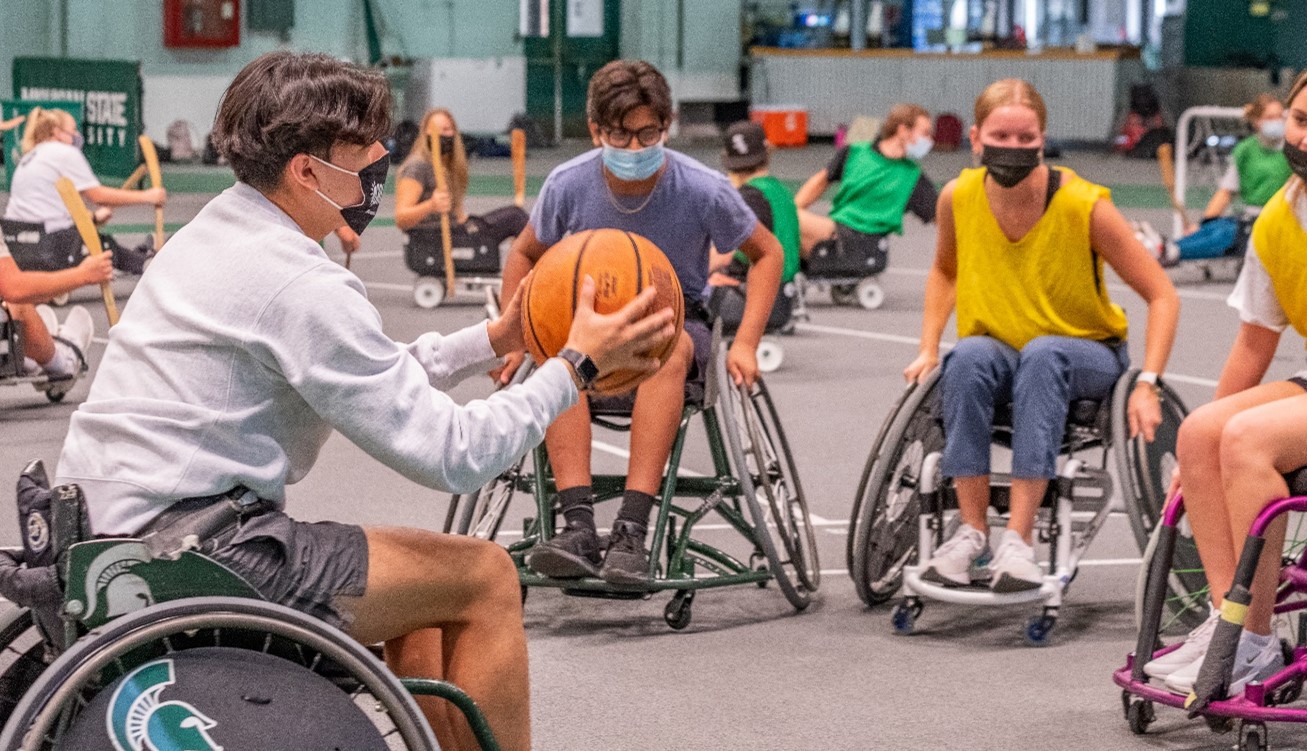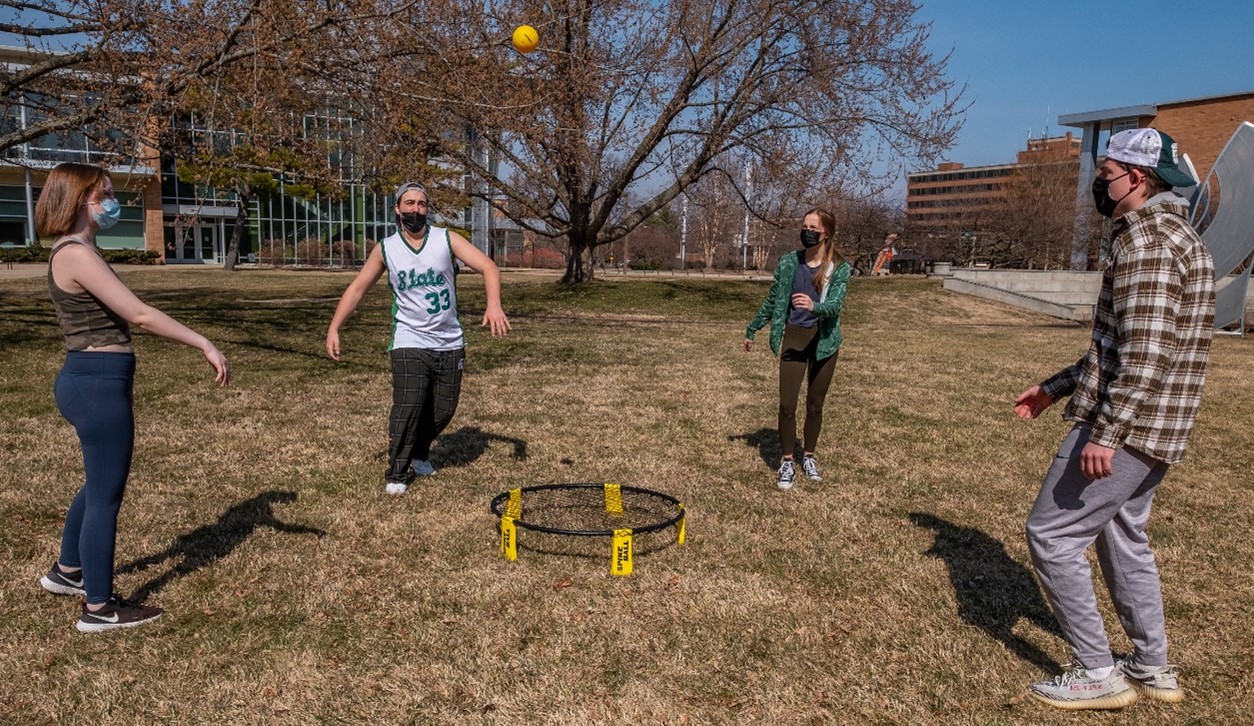Student Success in MSU2030 starts with the goal to increase the 6-year graduation rates 5% “because a college degree is the best route to individual opportunity.” University concerns about stress and mental health among students is well founded. A new report by Gallup and the Lumina Foundation “finds that among students who’ve considered withdrawing, more than half (55%) are driven by emotional stress, but specifically bachelor’s students, who fare worse at 69%.” These staggering statistics add complexity and urgency to arranging resources for student success beyond the classroom.
 In 2022, 87% of MSU students reported feeling overwhelmed at least once and 47% indicated that depression hindered their ability to focus. While these statistics are down slightly from 2021, they are cause for concern. The State of Spartan Health 2022 reminds us that regular exercise can improve mental and physical health, fight depression, anxiety and stress. When anxiety and depression are lessened, students have more ability to focus, learn and complete their degree. The MSU Air Force ROTC uses a model that results in better than average student grades while also coping with the stresses of being an undergraduate. Combining exercise, leadership training, and aerospace studies in a cohort offers many benefits.
In 2022, 87% of MSU students reported feeling overwhelmed at least once and 47% indicated that depression hindered their ability to focus. While these statistics are down slightly from 2021, they are cause for concern. The State of Spartan Health 2022 reminds us that regular exercise can improve mental and physical health, fight depression, anxiety and stress. When anxiety and depression are lessened, students have more ability to focus, learn and complete their degree. The MSU Air Force ROTC uses a model that results in better than average student grades while also coping with the stresses of being an undergraduate. Combining exercise, leadership training, and aerospace studies in a cohort offers many benefits.
“Our students spend three hours a week learning and exercising leadership skills that require them to organize and manage a group of people to solve complex scenarios and achieve an objective. Additionally, cadets spend a minimum of 2 hours per week physically training as a group,” says Lieutenant Colonel Brenton Gaylord. “They share rigorous training experiences designed to grow critical thinking skills and resilience in a physically and mentally stressful training environment. This builds them up holistically as a team to be the leaders our U.S. Air Force and U.S. Space Force needs. They have a community and a support system,” Lt Col Gaylord explains. Air Force ROTC students average a 3.49 GPA.
MSU proactively combined and designed resources to create University Health and Wellbeing to help students develop healthy behaviors, manage mental health, and get immediate support in a crisis. The division brings together 11 departments that support student, faculty and staff health and wellness and is led by Vice Provost and Executive Director Dr. Alexis Travis. University Health and Wellbeing is a cornerstone for creating a culture of health and wellness at MSU.
“We see exercise as a complement to medical and mental health services. We enjoyed the Izzo Legacy 5K Walk/Run on campus and promote Move More all semester,” said Travis. “MSU recognizes that wellness requires a holistic approach to mind, body and social dynamics. We are fortunate to have excellent programs for exercise and recreation.”
Encouraging participation in exercise is critical to address isolation and loneliness. The State of Spartan Health 2022 found that 71% of students felt very sad or lonely at least once in the last year, up from 67%. Exercise and activities can help form connections with new people which moderates loneliness and sadness.
“The Rec Sports Department provides opportunities for all MSU students to find movement they enjoy and to stay active,” says Angela Michael, associate director for Recreational Sports and Fitness Services. “We want students to move! Our most recent study showed that MSU students involved in our Intramural Sports program had higher retention rates and increased GPA than those who did not engage in these activities. Of Club Sports participants from this year, 85% shared their participation in their club team positively impacted their stress management and 92% said it positively affected their self-confidence. We offer something for everyone! Encourage students to take study breaks to move; it will help them in the coming weeks!”
 Matthew B. Pontifex, Ph.D., associate professor in the kinesiology and psychology departments has studied the effects of bouts of exercise on memory. “We know that across the lifespan that bouts of exercise and physical activity engagement relate to superior ability to allocate attention, manage environmental interference and promote better memory. And we know the importance of exercise and physical activity for underlying academic achievement and performance in the classroom,” says Pontifex. His work confirms that attention, reading and arithmetic improve after bouts of exercise. Research on screen time, sleep and physical activity in undergraduates indicates that physical activity along with sleep reduces stress. “We can’t understate the importance of maintaining positive health behaviors—being active and getting good quality sleep,” explains Pontifex.
Matthew B. Pontifex, Ph.D., associate professor in the kinesiology and psychology departments has studied the effects of bouts of exercise on memory. “We know that across the lifespan that bouts of exercise and physical activity engagement relate to superior ability to allocate attention, manage environmental interference and promote better memory. And we know the importance of exercise and physical activity for underlying academic achievement and performance in the classroom,” says Pontifex. His work confirms that attention, reading and arithmetic improve after bouts of exercise. Research on screen time, sleep and physical activity in undergraduates indicates that physical activity along with sleep reduces stress. “We can’t understate the importance of maintaining positive health behaviors—being active and getting good quality sleep,” explains Pontifex.
From mindfulness to simple movement, faculty and staff can use exercise to reduce student stress. Encouraging students to blend exercise into their study habits and to explore breathing exercises before test taking are meaningful ways to promote the culture of wellness and of educational excellence. To learn more about responding to students in mental health crisis, MSU has these resources.